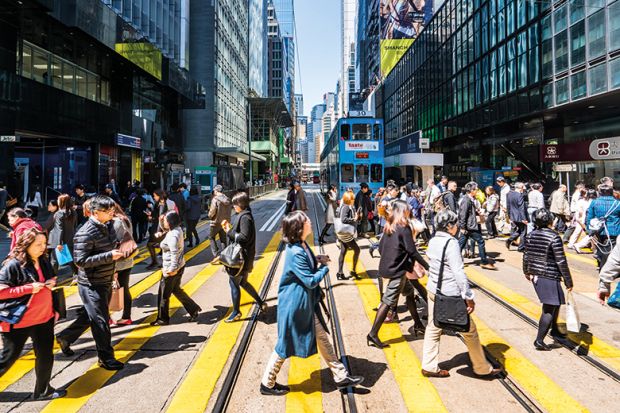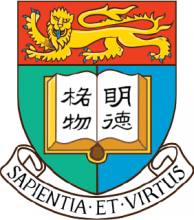Peter Mathieson’s announcement earlier this month that he was to resign as vice-chancellor of the University of Hong Kong (HKU) was almost as controversial as his appointment in 2014.
Chan Yuen-ying, director of HKU’s Journalism and Media Studies Centre, wrote on her blog in 2013 that “if a medical professor from the British city of Bristol, with a population of 430,000, is to parachute into Hong Kong to…safeguard our freedom, that’s a big joke”.
Now, after almost three years leading the institution, Professor Mathieson is facing a similar backlash from some after announcing that he will lead the University of Edinburgh from 2018.
In a recent South China Morning Post article titled “Vice-chancellor Peter Mathieson does not deserve Hong Kong”, columnist Michael Chugani labelled the university leader as “an opportunist” and questioned why the city state cannot hire its own talent.
“This is what we are – suckers who either can’t produce our own talent or have no faith in them. We pay top dollar to outsiders who either can’t handle the job or use us as a stepping stone,” he wrote.
Other articles in the Hong Kong press have also expressed concerns about Professor Mathieson’s “premature” resignation, which comes two years before his contract ends.
Speaking to Times Higher Education, Professor Mathieson admitted that the “timing is not ideal” and that “it was not in my nature to think of leaving HKU before I had finished my term”.
However, he “wasn’t certain whether or not I would be offered a second term” at HKU and the post at Edinburgh was “too good an opportunity for me to turn down”, he said.
He was most “persuaded” to apply for the top job at Edinburgh because of the “degree of match that there seemed to be between what Edinburgh were looking for and what I thought I had to offer”, he added.
For instance, Professor Mathieson’s experience working in Asia gives him unique credentials to drive the Scottish institution’s internationalisation, while his “widening participation background” also suits the university’s goals around access.
Professor Mathieson said he also had a “sentimental” attachment to Edinburgh as his father was born and brought up there.
“There was a romantic idea in thinking I could go and finish my career in the city where my father was born,” he said.
His decision to leave Hong Kong comes after Professor Mathieson led HKU through some of the most tumultuous times in its history.
Five months after taking over the helm, Occupy Central began. HKU’s staff and students were among the leaders of the movement, which protested against Beijing’s influence in Hong Kong and China’s decision to screen candidates in the 2017 election for the territory’s leadership.
In 2015, the university’s council voted to reject the appointment of a liberal professor to the post of pro vice-chancellor, against Professor Mathieson’s wishes, resulting in a fresh academic freedom row.
Professor Mathieson said academic freedom is “alive and well in Hong Kong and at HKU” but he admitted that he has “spent a lot of time and effort” articulating the importance of such autonomy.
“People sometimes misuse the term academic freedom. People outside universities sometimes think it means universities believe that they’re untouchable and they can do whatever they like without any accountability. And I don’t believe that is the case,” he said.
“But I do believe in academic freedom and I do believe in institutional autonomy in as far as it can be achieved in a publicly funded system.”
He might be forgiven for feeling a sense of relief that he won’t have to deal with such political pressures at Edinburgh, but Professor Mathieson denies that this was a factor in his decision to leave and rejects the notion that he is grateful to be waving goodbye to this aspect of the job.
“I’m a kidney doctor, I relish complexity and in many ways I think I’ve thrived on some of the complexity here,” he said, noting that he considers the “demanding” aspects of the role and the pressure “from all sorts of directions” as “part of the job”.
“It’s not something I felt I couldn’t handle or that I needed to run away from,” he added. “It’s a great deal of satisfaction to me having navigated some really quite turbulent waters.”
And Edinburgh will “have its own complexities” around Brexit, he continued, “so I don’t think I’m necessarily heading for a simple life”.
“I think actually the experience I’ve had here with the political complexities and dealing with two governments and the media interest and the public interest, I think that will actually prepare me very well for Scotland,” he said.
Now that the hunt is on for a new leader at HKU, does Professor Mathieson suspect a pro-Beijing chief could be appointed this time?
He isn't sure but stands by his previous statement, made when he was first appointed, that it has “been an advantage to be an outsider”.
“It’s much simpler for me to just concentrate on what I think [is] in the best interests of the university and not be cluttered by any kind of history or personal connections,” he said.
Register to continue
Why register?
- Registration is free and only takes a moment
- Once registered, you can read 3 articles a month
- Sign up for our newsletter
Subscribe
Or subscribe for unlimited access to:
- Unlimited access to news, views, insights & reviews
- Digital editions
- Digital access to THE’s university and college rankings analysis
Already registered or a current subscriber? Login








